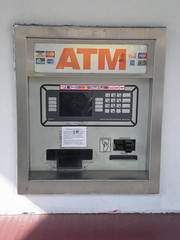You should never take cash out of the ATM using your business bank account. Never.
If you never have and never will take ATM cash out of your business account, you’re done here. Go read a different post, I’m not worried about you. If you still think it’s okay to make a cash ATM withdrawal from your business account, keep reading. Imagine you’re routinely getting whacked upside the head with a rolled up newspaper about every two minutes until you learn this lesson.
Why not use the business account for the ATM?
1. It’s a blazing red flag to the IRS that you’re doing something naughty. Even if everything you do related to your ATM withdrawals is 100% legitimate, to the IRS it says, “I’ve been a scumbag! Make me pay more taxes!” It’s really not a message you want to convey.
2. It’s bad bookkeeping practice. You have income and expenses. You take money in and you spend it. You need to account for how you spend it. An ATM cash withdrawal doesn’t give you the paper trail you need for your expenses. Even if you’re good about keeping those receipts (and believe me, you’d be the exception) you’re still stuck with issue number 1 – blazing red flag to the IRS.
But I own the business and it’s my money, why can’t I just make a withdrawal? Good question. Let’s say you’re just a plain sole proprietor, nothing fancy. You’re absolutely right; that’s your money and you’re entitled to use it as you see fit. If you’re keeping a separate bank account for your business, then you should write a check from your business to you for your “draw”. That’s legit and it gives you a paper trail. Whenever you take money from your ATM, it is considered as going to you and you’ll be taxed as that being your profit.
Here’s an example: Fred takes $200 a month out of his business account to pay some contract laborers. He occasionally hires some kids from the local football team to help him with his moving company. He pays the boys in cash and has never paid any one boy more than $600 so he hasn’t had to issue a 1099 (1099s must be issued if you pay $600 or more.) Fred gets audited by the IRS. He’s claimed $2400 in expenses for contract labor. That’s the $200 a month cash he’s paid to the boys on the football team to help him with some moving projects. What the IRS sees is $2400 in ATM cash paid directly to Fred and they charge him $1200 in taxes and penalties for under-reported income. Fred will have a very difficult time fighting this. It’s possible that he can fight and win, but why be in that position in the first place?
Let’s move it up a notch, what if Fred has an LLC-a limited liability company? Let’s say Fred takes an ATM withdrawal from his business account so he can take his wife out to dinner. Once again, its Fred’s money and he has that right. But now Fred is treating his business account as a personal account. This messes up his “limited liability” status. If you don’t keep a strict line between your business account and your personal account, you risk losing your limited liability protection. This makes it even more important for Fred not to use his business ATM card for cash if he has an LLC.
How’s your head? Been smacked enough times? Bottom line: never make an ATM cash withdrawal from your business bank account. If you want to pay yourself, write yourself a check. If your business needs to use cash, set up a petty cash account and fund it by writing a check for petty cash. A clean paper trail will keep the IRS off your back and that means money in your pocket.

